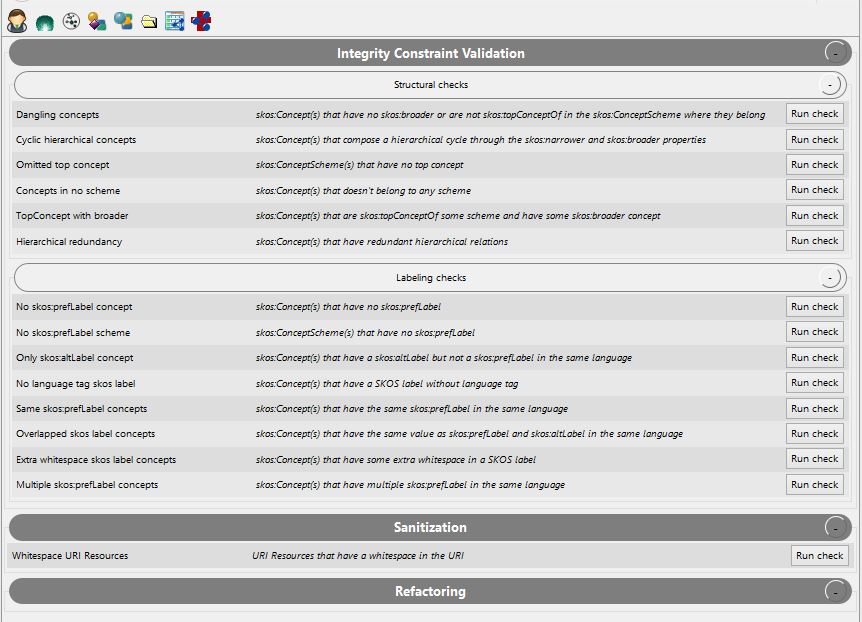ICV (Integrity Constraint Validation)
Semantic Turkey features a set of Integrity Constraint Validation (ICV) checks that can be run on the ontologies and thesauri being edited, in order to validate their content.
Currently most of the checks are for SKOS and SKOS-XL thesauri, as thre SKOS standard includes many constraints which are not expressed through OWL axioms and which need thus dedicated machinery in order to be verified. In the near future more checks for OWL ontologies will be implemented.
The ICV tool can be accessed by clicking on the proper icon ![]() in the Semantic Turkey toolbar.
The ICV tool is hosted in a dedicated page which is opened in a new tab. All of the available entriesare actually not just validation checks, but each of them provide fixing utilities for any inconsistency found.
in the Semantic Turkey toolbar.
The ICV tool is hosted in a dedicated page which is opened in a new tab. All of the available entriesare actually not just validation checks, but each of them provide fixing utilities for any inconsistency found.

Basically in ST the ICVs are separated in two main set of checks:
- Structural checks: these checks verify that the integrity of the structure of the thesaurus (hierarchy, relations etc..) is not broken. In case, fixing
- Labeling checks: label-focused checks. Different checks are proposed wether the analyed thesaurus is a SKOS or SKOS-XL thesaurus.
Structural checks
The structural checks, as the name suggests, allow to identify and fix structural problems as the presence of dangling concepts in any scheme (i.e. concepts that, for any given scheme, have no broader concept belonging to the same scheme and that are not top concepts of that scheme ), structural cycles, skos schemes that have no top concept and so on. For further information just take a look to the following screenshot that shows the available checks for a SKOS project.

Labeling checks
The labeling checks concerns integrity breaks such as: concepts that haven't a preferred label, concepts with more than one preferred label in the same language, concepts with identical labels in the same language and so on. The following figure provides the currently available checks.

Other checks
The ICV section will soon be revised in a general "Global Data Analysis" section. Two further sections are being added, which cannot be considered necessarily ICVs:
- Sanitization
- Refactoring
At the moment the Refactoring group is empty, while in the Sanitization group is available just one check that allows to fix concepts that have URI with whitespaces.
The Refactoring will include mass transformation from SKOS to SKOSXL data (and viceversa) and other global refactoring changes.



